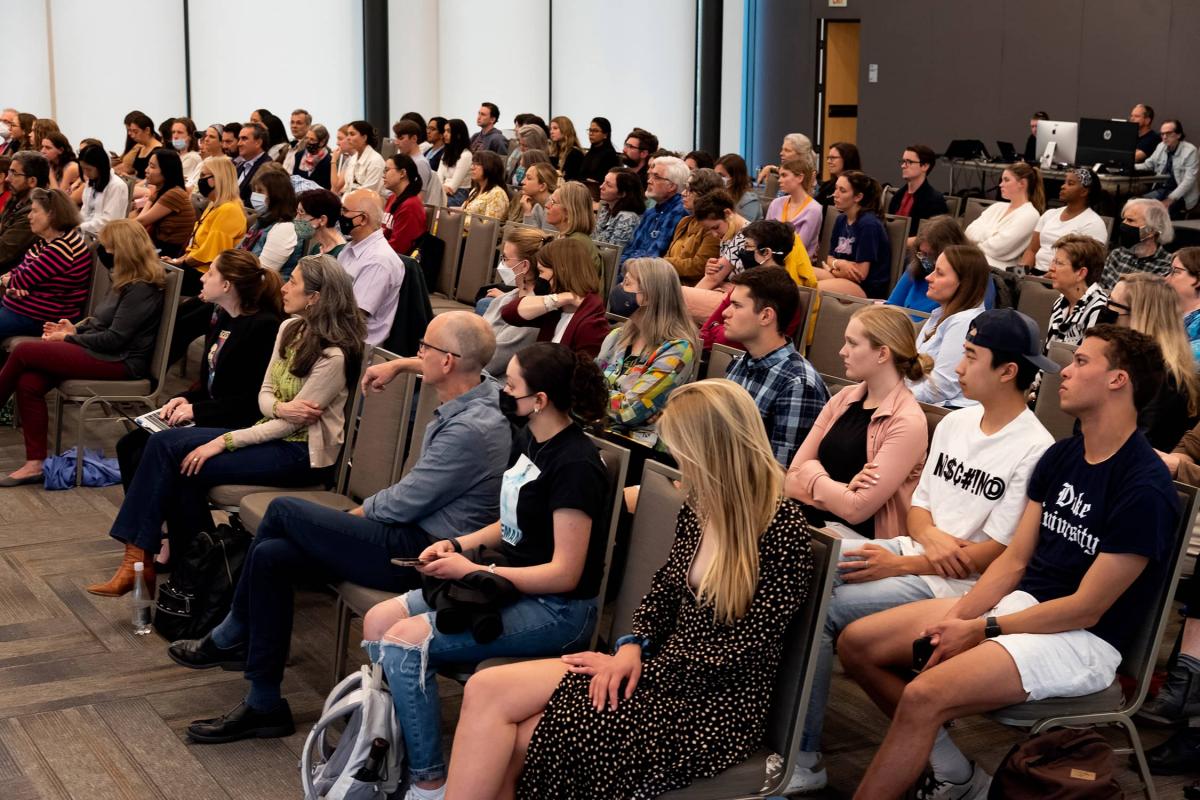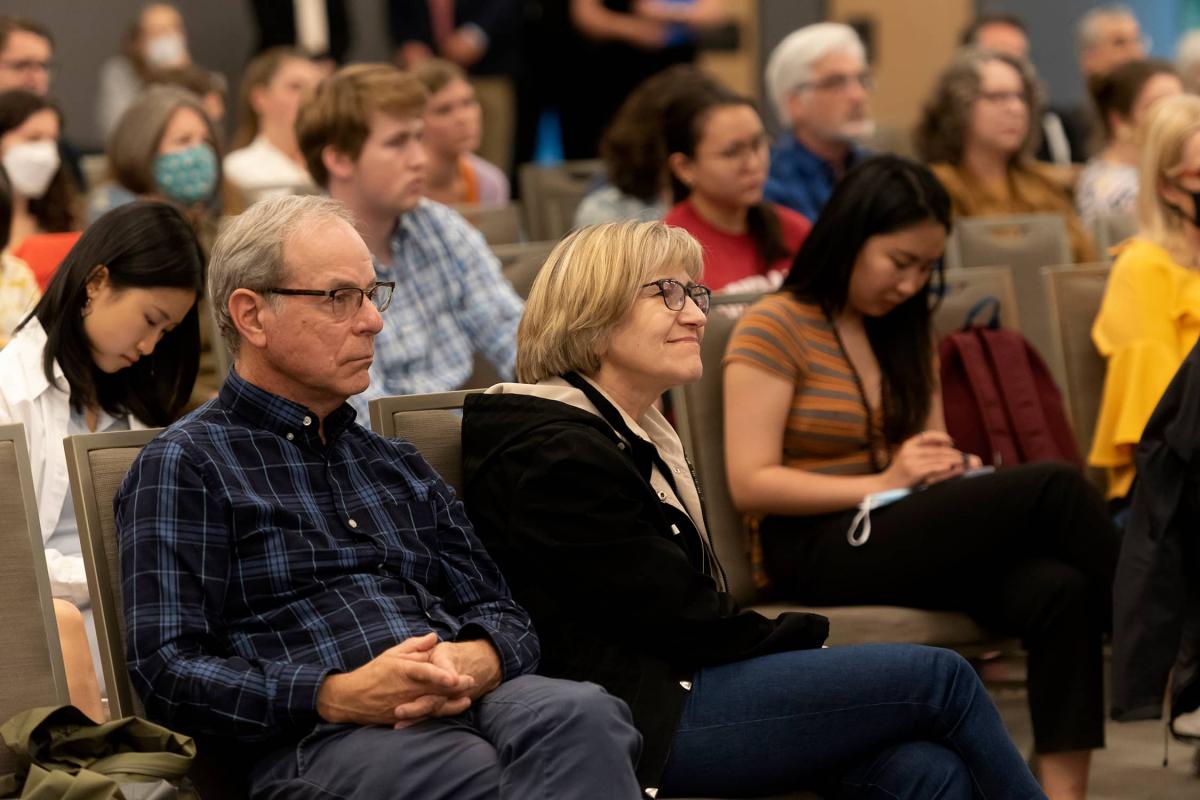
In a hybrid event at Penn Pavilion, a live and online audience watched a discussion on the history of NPR and the future of journalism on April 5 as part of the Terry Sanford Distinguished Lecture, endowed by the Endowed by the William R. Kenan, Jr. Charitable Trust. On stage, Frank Bruni, professor of the practice of journalism and public policy and New York Times columnist, talked to NPR journalists Susan Stamberg and Linda Wertheimer, shown on screen via Zoom. Both the Sanford School of Public Policy and NPR are celebrating 50 years since their beginnings.
Any lingering awkwardness of the hybrid format vanished the moment the audience heard those voices, so familiar from decades of stories about the latest news, whether about Congressional actions, news of the day or the annual Thanksgiving recital of Mama Stamberg’s cranberry relish recipe.
Featured Video
Terry Sanford Lecture: A Conversation with the Founding Mothers of NPR
Bruni started by asking the two journalists their thoughts on how the media is performing in their coverage of the Russian invasion of Ukraine.
Wertheimer, who covers politics, talked about how this war is being seen on TV in real time as something new. “We have never seen such graphic displays,” she said.
She is unsure if this is good or bad. “The coverage has revealed a tremendous and horrifying look at war, but it’s hard to understand what we are seeing,” she said.
Wertheimer thinks we haven’t yet found a way to talk about it. “I don’t have a sense of what possibilities exist for talking (everyone) off the ledge.”
For Stamberg, this is “a woman’s war in a way that it has never been before.” There are female anchors and female war correspondents in the field covering the conflict. Women were not given those kinds of assignments before.
Stamberg is following the news through newspapers, she said. “The photojournalism is so powerful, it is extraordinary, and makes it so visceral.”
She recalls discussions in newsrooms of the Vietnam war, especially the iconic photo of the naked child running away from a Napalm attack. Her friend, journalist John Moss, who was a Quaker, “fought to have the photo run on the front page above the fold,” she said. His reason, she said, “They need to see that war is, in fact, hell.”
The conversation then touched on the recent hearings on the Supreme Court nomination of Ketanji Brown Jackson.
“It’s difficult to understand how the American people could respect some members of Congress after what they said,” Wertheimer said. “It didn’t used to be so vicious.”
“Permission has been given at the highest level to be that ways,” said Stamberg. She says the behavior is breaking down our institutions, which are shakier than ever.
As to the prominence of women from the beginning of NPR, there were both practical and philosophic reasons, the two said.
“We didn’t have to fight a legion of men who were hired 50 years ago,” said Wertheimer. “It was a start-up, we could move in and move up. We had a leader who didn’t worry about ‘before,’ there was no ‘before,’” she said. They were committed to presenting programs that “sounded like America,” and since women were half of the country, they brought that perspective. But they sacrificed early on.
“There was the extreme poverty at the beginning,” said Stamberg. Both she and Wertheimer were married and “could afford to take the pathetic salary.” Men didn’t stay long, because they had families to support.
There wasn’t the same kind of competition 50 years ago, Stamberg pointed out. There were the big TV networks, NBC, ABC, and CBS. PBS was starting.
“They were rich, rich, rich, and we were not. We had to find other ways to get it done,” she said. “We analyzed everything a day late.”
Stamberg pointed out that Wertheimer started “on air as a consumer reporter, nobody else had that. It was different.”
Wertheimer told the story of how she, Stamberg, and two other NPR founding mothers, Cokie Roberts and Nina Totenberg, were interviewed by other media organizations. They were all told, “We already have our woman.”
While Stamberg and Wertheimer are impressed by the progress that has been made, especially for women and for journalists from diverse backgrounds, they were also both concerned about the fragmentation of the current news ecosystem.
Stamberg is worried about “the loss of community, the loss of what we need to know,” instead of just what we want to know. She is encouraged though, by the ideas she sees at NPR to combat the fragmentation and the increased competition. “I can see from the memos and responses, the ideas are coming from the young reporters, people in their 20s,” she said.
“I think we are all motivated, and those of us who came first certainly were to make the world a better place, as your dean spoke about the school,” Stamberg said.
“And I certainly was motivated in coming to NPR feeling that is was a place I could work in a unified way to make things better and improve the world,” she said.
Bruni asked the two how students should prepare for a career in journalism.

Wertheimer replied that they have to be willing to be edited and to be told what to do. The stories on NPR were always well edited, she said, but it can be hard to get used to. Students should understand “the care with which people try to make sure you don’t say anything stupid,” she said. That is what concerns her with the explosion of podcasts, whether they are well-edited.
She also said you have to take whatever assignments you are given. “It didn’t occur to me to say no, but it occurred to my mother. She was terrified at the things I had done,” Wertheimer said.
Stamberg said students should get “a good solid liberal arts education.” It expands one’s sense of the world, the breadth of it. College is the only place where you can look at things with that level of intensity, she said. “It will prepare you to raise questions. Journalism shines light in the darkest places.”
- Learn more about Sanford’s distinguished lectures
- Learn more about 50 years of public policy at Duke





